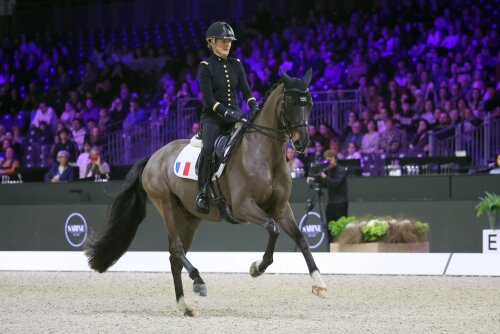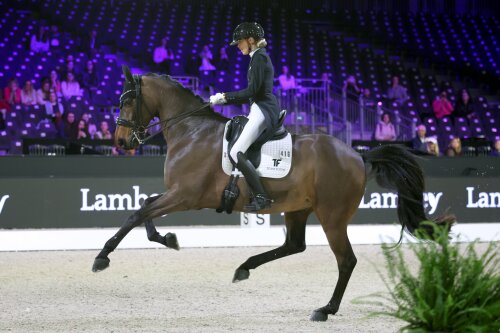"The training of a horse is a science, the riding of a horse is an art," said Vitor Silva.
Vitor Silva is a world renowned classical dressage Master, who established Sons of the Wind Farm in Merrimac, Massachusetts, USA in 1997. A native of Portugal, he has paired his natural talent with immense amounts of education to build a successful program where he prepares horses and riders through to the highest levels of the sport. Opening the stable doors of Sons of the Wind Farm unveils a cumulation of hundreds of years of tradition. It's a tradition whose core values have the power to transcend disciplines. Growing up in an agricultural household his interests were fostered with the guidance of his father, and he followed his dream of becoming a great horseman while always being grounded by the classical principles. At their core he explains these principles to be: letting the horse develop their natural movements, not cutting corners and training without gimmicks.
"No dressage riding is inventing anything. I certainly haven’t invented anything. I’m just hoping that I can continue paving the road of the old and great dressage masters that have existed," he said.
For Silva it's all about perspective, which is important the moment you begin working with a horse.
"Very traditional in this country we call starting a horse “breaking a horse”, in Portugal we call starting a horse “pruning a horse”, like it’s a tree, and we take the extra branches off so it can flourish," Silva said.
By operating a small breeding program in Merrimac, and a larger one in South America, he is able to start horses through his own approach.
Growing up in an agricultural household his interests were fostered with the guidance of his father, and he followed his dream of becoming a great horseman while always being grounded by the classical principles. At their core he explains these principles to be: letting the horse develop their natural movements, not cutting corners and training without gimmicks.
"No dressage riding is inventing anything. I certainly haven’t invented anything. I’m just hoping that I can continue paving the road of the old and great dressage masters that have existed," he said.
For Silva it's all about perspective, which is important the moment you begin working with a horse.
"Very traditional in this country we call starting a horse “breaking a horse”, in Portugal we call starting a horse “pruning a horse”, like it’s a tree, and we take the extra branches off so it can flourish," Silva said.
By operating a small breeding program in Merrimac, and a larger one in South America, he is able to start horses through his own approach.
 Working with the equine parter, as opposed to against, is a theme that surfaces over and over again in conversation with Silva about riding education, and one that is finely woven into his practice. "The horse still is a creature that can think for themselves, and so you better get along with it," said Silva.
Yet, it's no secret that in some cases riders who feel the pressures of showing might push too quickly through the levels in an effort to stay competitive. Silva suggested that when encountering challenges take a step back and look at the bigger picture, instead of seeking out short-term solutions.
"From a classical perspective, in modern dressage sometimes we lose those principles. You have to ask, what am I riding for?" Silva posed.
"So there is fundamentally all of this pressure of being competitive and we have to slow down, because when we are riding a horse we are not competing against anybody, we are competing against ourselves."
And no matter what your end goal might be, all riding boils down to the same three essential parts, "My opinion is good riding is good riding no matter what discipline you do. It's the foundation, a horse has to be balanced walk, trot and canter."
Working with the equine parter, as opposed to against, is a theme that surfaces over and over again in conversation with Silva about riding education, and one that is finely woven into his practice. "The horse still is a creature that can think for themselves, and so you better get along with it," said Silva.
Yet, it's no secret that in some cases riders who feel the pressures of showing might push too quickly through the levels in an effort to stay competitive. Silva suggested that when encountering challenges take a step back and look at the bigger picture, instead of seeking out short-term solutions.
"From a classical perspective, in modern dressage sometimes we lose those principles. You have to ask, what am I riding for?" Silva posed.
"So there is fundamentally all of this pressure of being competitive and we have to slow down, because when we are riding a horse we are not competing against anybody, we are competing against ourselves."
And no matter what your end goal might be, all riding boils down to the same three essential parts, "My opinion is good riding is good riding no matter what discipline you do. It's the foundation, a horse has to be balanced walk, trot and canter."
 There's teaching a horse a good walk, trot and canter, and then there's teaching the rider. At Sons of the Wind Farm the process is equally important, and much the same.
"The way I start a horse is the way I start a rider. Exactly the same mimic. So the horse needs balance, needs confidence, so we should not rush. That rider needs balance, needs confidence, needs to become self aware before we start asking them to do things," explained Silva.
He uses a lunge line to help the riders develop a balance a sense of control of their own body, and works on a long line to introduce riders to upper level movements. Work on the long line helps familiarize riders with the feeling of the upper level movements, giving them a clearer understanding of what they're meant to achieve. And Vitor Silva's classically trained Lusitanos are the perfect partners, as they're educated both in-hand and under saddle.
"A riding school is not because we teach riding lessons. In schools all students have access to a library. My barn, it’s a library, because every single horse can tell you a story. They can be a chapter in your riding, because they all can teach something," said Silva.
He speaks with the wisdom acquired by the years of trials and tribulations that inevitably come with working with horses. When he left Portugal almost thirty-years ago he questioned his future in the industry.
"I left the country, I left my family. I left all my horses there...I mean there is a sense of sadness, even so I decided to leave. It was all good, I could go back, but I left little piece of my heart back there. And so there was just that kind of thing I needed to settle in," said Silva, "Anything with horses reminded me of home."
But sometimes all that's needed to get through difficult times is an extra push of motivation. Silva described a friend that relentlessly encouraged him keep riding and training.
There's teaching a horse a good walk, trot and canter, and then there's teaching the rider. At Sons of the Wind Farm the process is equally important, and much the same.
"The way I start a horse is the way I start a rider. Exactly the same mimic. So the horse needs balance, needs confidence, so we should not rush. That rider needs balance, needs confidence, needs to become self aware before we start asking them to do things," explained Silva.
He uses a lunge line to help the riders develop a balance a sense of control of their own body, and works on a long line to introduce riders to upper level movements. Work on the long line helps familiarize riders with the feeling of the upper level movements, giving them a clearer understanding of what they're meant to achieve. And Vitor Silva's classically trained Lusitanos are the perfect partners, as they're educated both in-hand and under saddle.
"A riding school is not because we teach riding lessons. In schools all students have access to a library. My barn, it’s a library, because every single horse can tell you a story. They can be a chapter in your riding, because they all can teach something," said Silva.
He speaks with the wisdom acquired by the years of trials and tribulations that inevitably come with working with horses. When he left Portugal almost thirty-years ago he questioned his future in the industry.
"I left the country, I left my family. I left all my horses there...I mean there is a sense of sadness, even so I decided to leave. It was all good, I could go back, but I left little piece of my heart back there. And so there was just that kind of thing I needed to settle in," said Silva, "Anything with horses reminded me of home."
But sometimes all that's needed to get through difficult times is an extra push of motivation. Silva described a friend that relentlessly encouraged him keep riding and training. "Every weekend he would be knocking on my door. And it wasn't something that was appealing to me because I just had left, it was just too fresh, but he insisted. So then I started getting more into the horses again and I haven't looked back."
With a successful program in Merrimac, and now another flourishing in Wellington it's clear that the rest is history.
His advice to others hoping to find their place in the industry is simple:
"For everyone if you really have the dream of the horses pursue it. Riding is simple, but not easy. Make the right decisions, surround yourself by good professionals, and pursue it. Don’t be afraid of failing, because a lot of times we fail and we come out the other end stronger."
"Every weekend he would be knocking on my door. And it wasn't something that was appealing to me because I just had left, it was just too fresh, but he insisted. So then I started getting more into the horses again and I haven't looked back."
With a successful program in Merrimac, and now another flourishing in Wellington it's clear that the rest is history.
His advice to others hoping to find their place in the industry is simple:
"For everyone if you really have the dream of the horses pursue it. Riding is simple, but not easy. Make the right decisions, surround yourself by good professionals, and pursue it. Don’t be afraid of failing, because a lot of times we fail and we come out the other end stronger."
Embracing the Values of Classical Dressage in Modern Sport With Vitor Silva
-
categories: international , USA



